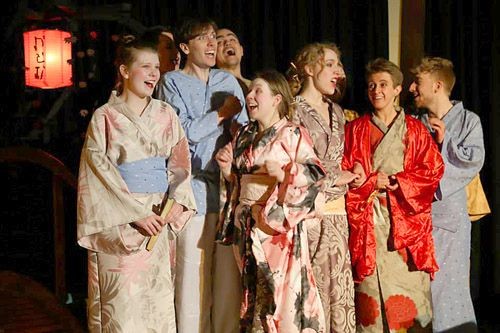 United Kingdom Gilbert & Sullivan, The Mikado: Manchester Universities Gilbert & Sullivan Society / Oliver Till (musical director), Council Chambers Theatre, Manchester. 26.3.2014 (RJW)
United Kingdom Gilbert & Sullivan, The Mikado: Manchester Universities Gilbert & Sullivan Society / Oliver Till (musical director), Council Chambers Theatre, Manchester. 26.3.2014 (RJW)

Cast
The Mikado of Japan — Edwin Dizer
Nanki-Poo — Sam Keeler
Yum-Yum — Elizabeth Barry
Ko-Ko — Jack Mayer
Pitti-Sing — Nancy May
Peep-Bo — Sophie Brown
Pooh-Bah — Peter Edge
Katisha — Amy Chambers
School Master — Stuart Dunlop
Pish-Tush — Dan Magnone
Production:
Directed by Freya Turton and Joel Fisher
Set Designer – Tegan Gilmore
Costume Manager – Ashley Carver
This annual event had to be changed from the Royal Northern College of Music’s well-equipped theatre to a multipurpose performing space due to rebuilding, so I was ready to make allowances for presentation. This proved to be unnecessary: the walk-in ambience with Japanese girls greeting the patrons and escorting them to their seats over a rustic bridge into the auditorium filled with Japanese lanterns and muted lighting was a brilliant concept.
This year the line-up of principals was strong and there were some exceptional singers amongst the main characters and chorus. (We have to remember that a university cast will change over a three/four year cycle.)
Sam Keeler (Nanki Poo) and Elizabeth Barry (Yum Yum) possessed charisma, were confident singers, and both carried the show along well with their sincere delivery of lines. Peter Edge (Pooh Bah), a rich bass voice, was appropriately aloof as fitted his station, but I felt more of a ‘swell’ was necessary (all jobs ‘rolled into one’). The audience liked the new business in explaining his many roles to Nanki Poo, with the constant changing of hats and wigs. Jack Mayer (Ko Ko) was suitably energetic, showed sincerity during his interaction with others, and was strong in his part. His Little List had been totally rewritten with some brilliant observation of news items and politics. It’s sometimes good to not have this character played like a clown: Jack played the part with a degree of intelligence that will allow him in Act II to work out a plausible reason why he has lied about beheading the heir apparent.
The quality of singing was high throughout and pointed to thorough rehearsing which gave polish to the performance. The audience was impressed by the lovely tonal balance of voices in Three little maids (Nancy May, Sophie Brown, Elizabeth Barry). The girls radiated their orange blossom innocence and elsewhere the characters projected their voices well with clear diction.
There are many other good aspects of the production by Joel Fisher and Freya Turton that deserve praise and a particular mention. It is clear that there has been good research into set design, and the elegant costumes (Ashley Carver) are very much in the tradition of Charles Ricketts’ impressive D’Oyly Carte production of the 1930s. It wouldn’t be Manchester University without technical wizardry — a practical running stream, styled as might befit a Willow Pattern plate, and well-disguised LED flickering lanterns were nice professional touches. Two visual effects are worth mention: marionettes dressed as Ko Ko and Yum Yum neatly act out lyrics and a shadow show to accompany Tit Willow (nicely sung by Ko Ko) were brilliant ideas. I enjoyed the fine chorus detail provided by Vicki Newton’s delightful choreography that brought added interest to the show throughout.
The amount of hours spent in creating a show to this standard is considerable, and this achievement was fully appreciated by the audience. Yet on a minor note, I think it might be helpful to have more characterisation revealed in make-up (a facially sneering Pooh Bah and an eccentric Katisha, perhaps). A care for characters not to turn upstage when an audience needs to see looks of astonishment, surprise, or reaction would be also welcomed.
Because of limitation of space in this temporary venue the usual full orchestra was reduced to a chamber ensemble, reminiscent of the old BBC’s Palm Court Orchestra’s days. Conductor, Oliver Till, trained the singers to an outstandingly high level and my only wish was that numbers like The flowers that bloom in the Spring could be taken at a less sedate pace. The hidden front-of-house and backstage operations were as slick as ever.
Raymond J Walker
